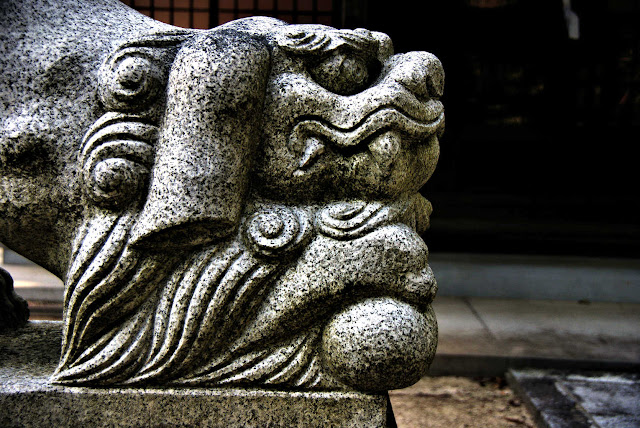Less than a kilometer away is Homan Shrine, and I'm guessing this was built as a branch of it in 1675.
Off the beaten track in Japan:- Nature, Culture, History, Spirit, Art....
Monday, April 28, 2014
Naka Homan Shrine
Less than a kilometer away is Homan Shrine, and I'm guessing this was built as a branch of it in 1675.
Saturday, April 26, 2014
Izumo 33 Kannon Pilgrimage Temple 14 Renge-ji
Wednesday, April 23, 2014
Toko-ji Temple, Hagi
The gate to Tokoji in Hagi has a somewhat Chinese feel because it is an Obaku Zen Temple founded in 1691. Obaku was a new sect of Zen founded by Chinese monks who came to Nagasaki to serve the Chinese community there.
Tokoji was founded by the third Mori lord as a second temple housing the graves of the Mori and their wives. The 3rd, 5th, 7th, 9th, and 11th Lords are buried here. The other are buried at Daishoin on the other side of town.
Most of the structures date from the 17th Century and are listed Cultural Properties. The temple complex is much reduced in size from earlier times, but it is still quite large and spacious, set in woods on the eastern edge of town.
The honzon, the principle deity statue, is Shaka Nyorai, which in English we would call the historical Buddha.
Monday, April 21, 2014
Ayo Shrine
Saturday, April 19, 2014
Manhole Ohanami
The annual cherry blossom viewing season is now over for most of Japan, but the cherry blossom can be seen year round by looking down. Not surprisingly given its cultural prominence the sakura appears as a design element in many, like this first one from Tadotsu in Kagawa, Shikoku.
It features as a minor design element in countless designs, like this one from Kamo Town in Izumo.
As I sorted through my files to find these I was expecting sakura to much more common than it is. I was surprised to find the Azalea being more common. The sakura above is from Mizukami in Kumamoto.
From Miyahara, also in Kumamoto, also featuring a rose.
From Toyoshi in Kagawa, with azaleas in the center.
Thursday, April 17, 2014
Hiroshima Peace Memorial Museum
The Hiroshima Peace Memorial Museum and Park was completed in 1955 following a competition to find a design in 1949. It was designed by Kenzo Tange, and brought him to international recognition.
It is generally considered to be the first Modernist piece of architecture in Japan and is considered the birth of post-war architecture.
The park and structures are laid out along an axis that points directly to what is now referred to as the A Bomb Dome, the ruin that stands at the epicenter of the blast.
One of the focal points is the Peace Flame located at the Cenotaph.
Since its original building in 1955 many new structures and monuments have been constructed in the park. In 1994 the Tange designed Memorial Hall was added.
Saturday, April 12, 2014
Izumo 33 Kannon Pilgrimage Day 6, May 19th, 2012
Friday, April 11, 2014
Shikoku 88 Pilgrimage Temple 24 Hotsumisakiji
Temple 24, Hotsumisaki-ji, is the first of the pilgrimage temples in Kochi and is located at the tip of Cape Muroto.
It is one of the few temples that has historical rather than legendary links to Kobo Daishi, being located on the hilltop above the cave where he spent 3 years until achieving enlightenment. he founded the temple in 805.
It was here that he took the name Kukai. It is a Shingon temple and the honzon (main deity) is Kokuzo Bosatsu, the deity that Kukai chanted to a million times. It was reputedly carved by Kukai.
It is a very popular site for visitors, and there is a large lodgings facility for pilgrims, but when I stayed there in September I was the only guest.
In the grounds is a large boulder with indentations. Supposedly if the boulder is hit with rocks different musical tones are emitted. I didnt try it so I can't vouch for the veracity.
Wednesday, April 9, 2014
Hinobori Shrine
EDIT...... I have since learned that this is a hachimangu shrine.
Saturday, April 5, 2014
Komainu of Shikoku part 2
The second post on the diverse styles of komainu I encountered in Shikoku while walking the pilgrimage. The first post is here. With bibs as paw warmers, at Temple 16, Kannonji.
Guarding the approach to Kushibuchi Hachman Shrine in Tokushima.
Wrapped in shimenawa at Ikuchi Shrine, Tokushima.
At Ebisu Shrine in Naka, Tokushima. the male will often be depicted with a paw resting on a ball, but here the ball is balanced on the paw.
Its female opposite, often depicted with a cub/pup. The upper jaw seems to be missing which gives it a strange appearance.























